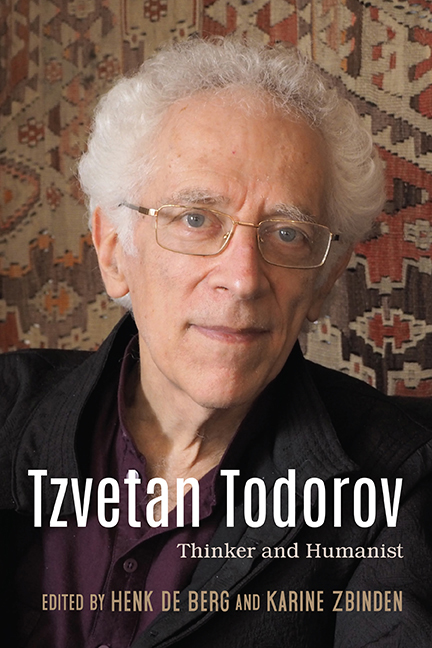Book contents
- Frontmatter
- Contents
- Acknowledgments
- Introduction
- 1 A Marginal Centrist: Tzvetan Todorov and the French Intellectual Field
- 2 Todorov and Camus
- 3 The Enlightenment Redux: Autonomy in Todorov, Glucksmann, and Onfray
- 4 Todorov's Reading of Rousseau: A Heritage for Our Times?
- 5 Tzvetan Todorov's Enlightenment
- 6 Todorov and Bakhtin
- 7 Tzvetan Todorov and the Writing of History
- 8 Tzvetan Todorov and the Trials of History: A Dissenting Voice
- 9 European Integration and the Cultural Cold War: Todorov and Denis de Rougemont
- 10 Tzvetan Todorov on Totalitarianism, Scientism, and Utopia
- 11 Tzvetan Todorov's Political Philosophy
- 12 Interview with Tzvetan Todorov
- Notes on the Contributors
- Index
1 - A Marginal Centrist: Tzvetan Todorov and the French Intellectual Field
Published online by Cambridge University Press: 26 April 2020
- Frontmatter
- Contents
- Acknowledgments
- Introduction
- 1 A Marginal Centrist: Tzvetan Todorov and the French Intellectual Field
- 2 Todorov and Camus
- 3 The Enlightenment Redux: Autonomy in Todorov, Glucksmann, and Onfray
- 4 Todorov's Reading of Rousseau: A Heritage for Our Times?
- 5 Tzvetan Todorov's Enlightenment
- 6 Todorov and Bakhtin
- 7 Tzvetan Todorov and the Writing of History
- 8 Tzvetan Todorov and the Trials of History: A Dissenting Voice
- 9 European Integration and the Cultural Cold War: Todorov and Denis de Rougemont
- 10 Tzvetan Todorov on Totalitarianism, Scientism, and Utopia
- 11 Tzvetan Todorov's Political Philosophy
- 12 Interview with Tzvetan Todorov
- Notes on the Contributors
- Index
Summary
WHEN PROMPTED TO SITUATE HIMSELF among the intellectual debates of his time, Tzvetan Todorov answered: “I am neither eccentric nor excluded; I am simply a ‘marginal centrist.’” This self-description, focused as it is on the coexistence of opposites, should not come as a surprise to anyone familiar with Todorov's thought. After all, the refutation of Manichaeism is arguably the most striking trait of his highly reflective body of work. Indeed, it is—in his own words—the “main message” he wishes to pass on to his readers. But what, specifically, is the intellectual space to which Todorov is referring? This chapter will seek to answer this question by exploring Todorov's “marginal centrality” in relation to the evolution of French thought over the past fifty years. In so doing, I shall draw above all on Pierre Bourdieu's sociology. There are two reasons for this. First, Bourdieu's concept of the “intellectual field” offers a lucid representation of an organized social space in which agents perform their actions according to different poles of “consecration” (the naturalization and legitimization of social differences), resulting in different types of social, economic, and symbolic recognition. Second, there are—as will become clear in what follows—significant theoretical parallels between Todorov and Bourdieu. For both, the question of intersubjective recognition is central to the constitution of the self; for both, the rational subject is predetermined by the social world and yet capable of earning its own autonomy within it.
The key conceptual oppositions that Todorov attempts to synthesize— those between particularism and universalism, between identity and otherness, between autonomy and collectivism—have all been staples of French thought since the early 1960s, the time when Todorov left his native Sofia for Paris. One might even reasonably maintain, as Sudhir Hazareesingh did recently, that the very tendency toward binarism is typical of French intellectual life. Be that as it may, it is the French intellectual field in which Todorov has to distinguish, to “individuate,” himself as a thinker, and his thinking is thus dependent on this field in a twofold manner: it is as much determined by it as it attempts to shape and modify it.
- Type
- Chapter
- Information
- Tzvetan TodorovThinker and Humanist, pp. 20 - 42Publisher: Boydell & BrewerPrint publication year: 2020

